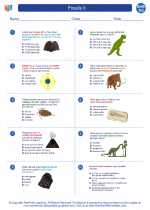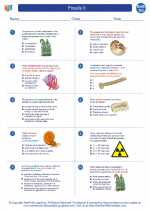Fossils II -> cell
Cell
A cell is the basic structural and functional unit of all living organisms. Cells can be categorized into two main types: prokaryotic cells and eukaryotic cells.
Prokaryotic Cells
Prokaryotic cells are simpler and smaller than eukaryotic cells. They do not have a distinct nucleus or membrane-bound organelles. The genetic material in prokaryotic cells is found in the cytoplasm in the form of a single circular DNA molecule.
Eukaryotic Cells
Eukaryotic cells are more complex and larger than prokaryotic cells. They have a distinct nucleus that houses the genetic material. Eukaryotic cells also contain membrane-bound organelles such as mitochondria, endoplasmic reticulum, Golgi apparatus, and lysosomes.
Cell Organelles
Cell organelles are specialized structures within a cell that perform specific functions. Some important organelles include:
- Nucleus - Contains the cell's genetic material and controls the cell's activities.
- Cell Membrane - Surrounds the cell and regulates the passage of substances in and out of the cell.
- Mitochondria - Produces energy for the cell through cellular respiration.
- Endoplasmic Reticulum - Involved in the synthesis and transport of proteins and lipids.
- Golgi Apparatus - Processes and packages proteins and lipids for transport within the cell.
- Lysosomes - Contain enzymes that break down waste materials and cellular debris.
Cell Functions
Cells perform a variety of functions essential for the survival of an organism. These functions include:
- Cellular Respiration - The process by which cells produce energy from nutrients.
- Photosynthesis (in plant cells) - The process by which cells use sunlight to convert carbon dioxide and water into glucose and oxygen.
- Cell Division - The process by which cells reproduce and multiply.
- Synthesis of Proteins and Lipids - Cells are involved in the production of various molecules essential for the functioning of the organism.
Cell Theory
The cell theory is a fundamental concept in biology that states:
- All living organisms are composed of one or more cells.
- The cell is the basic unit of structure and organization in organisms.
- All cells come from pre-existing cells through the process of cell division.
Understanding the structure and function of cells is essential for comprehending the biology of living organisms and the processes that sustain life.



